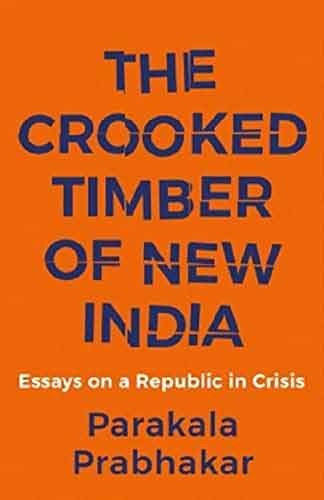Hyderabad based intellectual and analyst Parakala Prabhakar has given a gift to Indians and India watchers in his new book, The Crooked Timber of New India. It is a gift for many reasons – honesty, lucidity, and non-didactic exposition. Many previous reviewers have sung praises- and I am no different; here, I’ll add to the fandom but will also point out areas of divergence. This is exactly, I imagine, what Prabhakar would want.
In a series of 22 essays (an introduction and epilogue in addition), the author sets out to dismantle the PR edifice created by the BJP, Modi, and his acolytes. He does so with aplomb- never requiring complex language or recondite information. Certainly, he refers to a variety of data sets and provides complex arguments, but he does so in a logical, sensible, accessible, and convincing way. In this, he differs from many who likely share similar views- especially those housed in academia.
 The essays are at once distinct and interconnected. Covering topics like the Modi government’s response to Covid, the death of Stan Swamy, the parlous state of Indian varsities, Indian unemployment, the sale of PSUs, and the rise of state repression, he weaves a contrarian narrative. He carefully demolishes the arguments proffered by a large section of the Indian elite and NRIs that Modi has done wonders for all aspects of Indian life. He takes the government to task for its need to “eventize” everything it does, even the quotidian and failures.
The essays are at once distinct and interconnected. Covering topics like the Modi government’s response to Covid, the death of Stan Swamy, the parlous state of Indian varsities, Indian unemployment, the sale of PSUs, and the rise of state repression, he weaves a contrarian narrative. He carefully demolishes the arguments proffered by a large section of the Indian elite and NRIs that Modi has done wonders for all aspects of Indian life. He takes the government to task for its need to “eventize” everything it does, even the quotidian and failures.
The author is an independent thinker with a stunning command of data. He is clear to point out that Modi-support is not monolithic; different elements of society cheer-lead for him for different reasons and some just go along for the ride, cynically or otherwise. He displays both an academician’s knowledge but also a demotic touch. In this respect, he reminds me of the eminent journalist P. Sainath.
Prabhakar is a foil to the l’etat c’est moi Modi while not falling into arrogance. He never suggests that he has all the answers. His goal is to cut an Indian Zola figure and in this he acquits himself with distinction.
I can continue to heap praise, but I suggest that you read the book and draw your own conclusions. Now, I’ll spend a few minutes discussing my disagreements with some of the implications of the book and highlight one possible blind spot.
While the author is very clear on the fact that the BJP is not alone in its venality, repression, or iron-fistedness (he lambasts Ms. Gandhi, Congress, and other parties plenty), I think he might overstate the amity displayed by the Indian people before 2014. I sense that many on the Left in India do the same. My own observations, heretical to many, is that votaries of India’s majority religion by and large distrust and dislike both Muslims and Christians. In my time living in India, I was shocked at the cavalier comments, the lack of integration, and the condoning of violence against minorities. In addition, tomes could be written about the mistreatment of the poor, violence against Dalits and Adivasis, the sexism inherent in the Indian family structure, and so on. The point here is to say that I don’t see the idea of “One Nation” as feasible -certainly it won’t spring from the organic spirits and attitudes of Indians.
None of this is to imply that things have not gotten much, much worse since 2014, that the Emperor has not revealed his own bigotry, stoked violence, and increased the dose of poison. That, he has.
My second main disagreement has to do with the implications about the generally salutary nature of economic growth. As it is defined today, growth is a death-wish to the world- the more we create, consume, extract, and dispose of, the more we seal our own fate. Which leads me to blind spot in the book- the massive attack on the environment that is inherent in the current dispensation’s jumbled economic model.
The timber is crooked now but soon the real timber will be gone.
Whatever my disagreements, this short book of essays might just be the most important book on the “New India” recently released.
Romi Mahajan is an Author, Marketer, Investor, and Activist















































